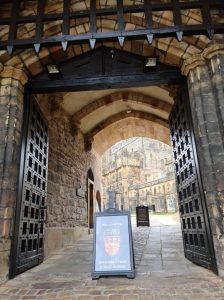Summary
The Faculty of Arts and Social Sciences (FASS) Health Hub was officially launched on the 5th of July 2022 in Lancaster Castle. This blog, written by attendee Emma Putland, reflects on some of the key questions to come out of the session for her, and how this has got her thinking about what exactly 'health' and 'research' should be...
The Faculty of Arts and Social Sciences (FASS) Health Hub was officially launched on the 5th of July 2022 not in an ivory tower but in a castle – Lancaster Castle, to be precise. The day was organised around two panels, with refreshingly short presentations and priority being given to the ensuing discussions that were sparked. These then led onto a final ‘pulling together of threads’ discussion in which people reflected on themes of the day and potential questions, issues and focuses of the Hub moving forward.

People from a range of different areas contributed to the day’s interdisciplinary debate, including (but by no means limited to) Law, Linguistics, History, Philosophy, English, Translation, Education and Migration Studies. As a linguist interested in different discourses of dementia, the following reflections orient around the questions and issues that I found particularly striking and applicable to a dementia context.
Starting with the supposedly simple basics of a definition, a philosopher reminded us to ask: what is health? What does it mean to make a life better and how should this be done? Relatedly, what are the distinctions between health and wellbeing, and – importantly – should disability be included within the remit of health? Two presenters who each work in the field of disability, Dr Sue Cranmer and Professor Charlotte Baker, expressed their initial confusion at being included within “health”. They were concerned that this reflects the medical model of disability, which regards disability as something “wrong” with an individual’s body/mind, rather than the social model that focuses on the way in which society disables individuals and seeks to uphold everyone’s human rights. This speaks to the debate surrounding dementia regarding whether it is a disease or a disability, which has important implications for how people experience the condition and are treated by society. For me, such debate signals the need for more a holistic, expansive definition that includes the social and political aspects of health.
Equally important is the question of what the role of the researcher should be. Is it recording and analysing? Advocacy? Critical thinking? Presenting roadmaps for social change? All of the above? Discussing their Doctors within Borders project, Dr Karolina Follis and Dr Luca Follis thought-provokingly reported how migrant populations responded to the question ‘what can the researcher community do for you?’ Answers suggest that it’s not simply analysis and dissemination of an issue but that researchers should share access to spaces, networks and resources, especially with marginalised communities, who could greatly benefit from a more inclusive approach moving forward.
Throughout, the need to listen to the perspectives, wants and needs of people with lived experience and other stakeholders emerged. Researchers must navigate multiple perspectives (including those that they do not agree with) in an effort to provide ethical, multidimensional and socially relevant work. In a world where stories hold great power – with Dr Claire Hardaker observing that personal narratives appear more persuasive than statistics for discussions of vaccines – it is worth considering how the Arts, in particular, can contribute to social change. Discussing disability and inclusion in sub-Saharan Africa, Prof. Charlotte Baker noted that the Arts can be used to showcase alternative explanations and perspectives. This is a particularly exciting aspect of contemporary dementia research, as although the Arts’ therapeutic benefits have been recognised, the potential for creative outputs to drive social change is only recently being explored and is increasingly being led or co-produced by people with lived experience.
These are just a taste of the many thoughtful questions being asked in the room, and more broadly across the academic community. It’s an exciting time to start a FASS Health Hub, and there will be many more discussions about what the future holds. What already seems to be the case is that this Hub seeks to be exceptionally collaborative, extend its reach (e.g., to PhD students and faculties beyond FASS), and continue to encourage interdisciplinary discussions of pressing and complex questions as it moves forward.